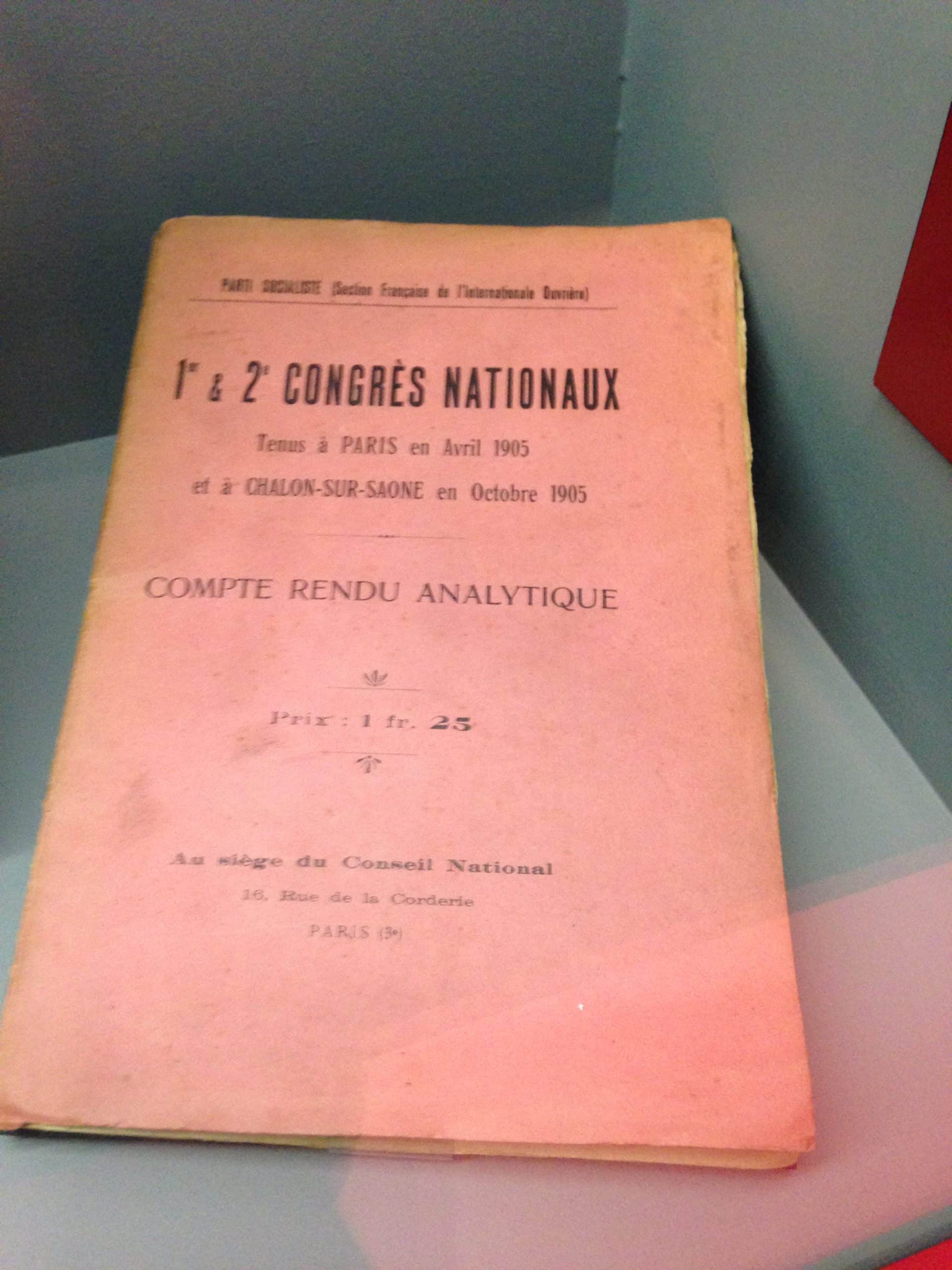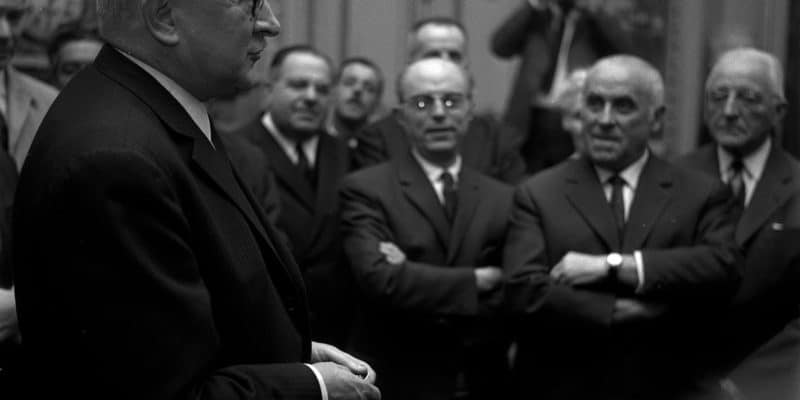Alcide Guy Mollet, born December 31, 1905 in Flers (Orne) and died October 3, 1975 in Paris, was a French statesman. Pupil of the Nation, he joined the French Section of the Workers’ International (SFIO) in 1923 and became an English teacher. After the Second World War, he joined the French Resistance and played an active role in the fight for the Liberation.
His beginnings in Pas-de-Calais politics
Elected mayor and general councillor of Arras in 1945, Guy Mollet was a French politician who played an important role in the country’s political life throughout the Fourth Republic. In 1946, he was elected deputy for Pas-de-Calais and became Secretary General of the French Section of the Workers’ International (SFIO), a position he held until 1969.
Guy Mollet was a key player in French politics during the Fourth Republic, playing an active part in the establishment of several governments and holding strategic ministerial posts. Among his most notable posts was that of Minister of State for European Affairs. In this position, he worked to strengthen cooperation between European countries and promote European integration, notably by supporting the creation of the European Defense Community (EDC), although this project was finally abandoned in 1954. As Secretary General of the SFIO,
Guy Mollet sought to modernize and strengthen the Socialist Party, focusing on issues such as economic and social reform, democratization and European construction. Under his leadership, the SFIO became a central political player, capable of influencing government decisions and participating in various coalitions. In addition to his position as Minister of State for European Affairs, Guy Mollet held other important ministerial posts in various governments. In particular, he was Vice-President of the Council in the Queuille cabinet (March-July 1951), contributing to the stability and coherence of the policies implemented by the governments of the day.

Guy Mollet was a member of the SFIO and then of the Socialist Party when it was founded.
Guy Mollet in Arras and Pas-de-Calais
The General Councils of the Third Republic, whose last members were elected in 1934 and 1937, were suspended by the French government in October 1940. Following the Liberation, the government decided to renew these councils in their entirety, holding elections on September 23 and 30, 1945. Before the war, the political majority in Pas-de-Calais belonged to the left-wing Republicans, i.e. the moderate right, which almost disappeared in 1945. The main political forces were the Mouvement républicain populaire (MRP), the SFIO and the Communist Party. Of the 158 candidates, 53% had actively participated in the Resistance, including three women (two Socialists and one Communist). Between the two rounds, a withdrawal agreement was reached between the Communists, Socialists and Radicals, excluding the MRP, which called on its voters to vote for the Socialists if necessary.
The elections resulted in a complete renewal of the political landscape and a resounding victory for the Left, with 22 SFIO members elected. Following this victory, Guy Mollet was elected President of the General Council with 42 votes out of 46 cast at the meeting of October 29, 1945. This election took place a few months after he had become mayor of Arras and a Socialist deputy in the National Assembly. In his inaugural speech, Guy Mollet spoke of France’s recent difficulties and paid tribute to the heroes who had fallen for the country during the Second World War. He also looked resolutely to the future, helping to write this new page of history.
The challenge is immense, as the department was hard hit by the war. Food shortages persisted, material destruction was considerable, and the country’s economic recovery was largely based on coal mining, which demanded considerable effort from miners, often to the detriment of their health. In 1946, Guy Mollet handed over the presidency of the General Council to Louis le Sénéchal and became an active member of the Second Constituent Assembly. Guy Mollet was mayor of Arras for a long period, from May 5, 1945 to October 3, 1975.
He held this position for 30 years, 4 months and 18 days, testifying to his commitment to the town and his prominent presence in local politics. Before Guy Mollet became mayor of Arras, René Méric held this position. René Méric was also a French politician and member of the SFIO, who had been a member of the Resistance during the Second World War, covering clandestine activities. After Guy Mollet’s long tenure as mayor, Léon Fatous succeeded him until 1995.
Guy Mollet, President of the French Council
In 1956, Guy Mollet became President of the Council of Ministers, a position he held until 1957. During this period, he was criticized for his handling of the Algerian War and the Suez Canal crisis. Faced with the impossibility of rallying a parliamentary majority behind a liberal line in Algeria, he pursued a repressive policy and refused any negotiated solution before the conclusion of a ceasefire, which historically set him at odds with General De Gaulle. Between October and November 1956, Guy Mollet allied France with Great Britain and Israel against Egypt in the expedition following Nasser’s nationalization of the Compagnie universelle du canal maritime de Suez. This maneuver was a resounding failure, due to the opposition of the USSR and then the United States.
The end of his career
After the fall of his government in 1957, Guy Mollet rallied to General de Gaulle in 1958 and helped draft the new Constitution. However, he soon returned to the opposition, believing that the Constitution in practice restricted the rights of Parliament and public freedoms far too much.
In 1969, Guy Mollet became a member of the new Socialist Party (PS) and from then on devoted himself to theoretical work, within the framework of the Office universitaire de recherche socialiste (OURS), which he had created and where his archives are kept. He died of a heart attack in 1975 and is buried with his wife in the Arras cemetery. Like De Gaulle, he is also one of the historical figures who are quoted when talking about Arras, Robespierre or even Adam de La Halle.
A square has been named after him, that of the town hall and administrative center.
Place Guy-Mollet is located in the center of Arras, near the town hall and administrative center. This location symbolizes Guy Mollet’s commitment as mayor of Arras for over 30 years and his role in the city’s development :
A high school is also named after him
R.C.
